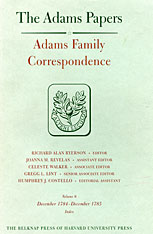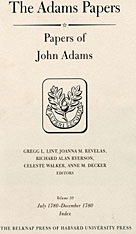
“I cannot O! I cannot be reconcil’d to living as I have done for 3 years past… Will you let me try to soften, if I cannot wholy releave you, from your Burden of Cares and perplexities?” So begins Abigail Adams’s correspondence to her husband in these volumes: a plea to end their long separation, as John Adams represented the United States in Europe while Abigail tended to family and farm in Massachusetts, and passed on to John crucial political information from Congress.
In October 1782, the Adams family was as widely scattered as it would ever be, with young John Quincy Adams in St. Petersburg, John at The Hague, and Abigail in Braintree with her daughter and younger sons. With the summer of 1784, however, Abigail would have her fondest wish, as most of the family reunited to spend nearly a year together in Europe. As the Adams family traveled, and as the children came of age, so their correspondence expanded to include an ever larger and more fascinating range of Cultural topics and international figures. The record of this remarkable expansion, these volumes document John Adams’s diplomatic triumphs, his wife and daughter’s participation in the cosmopolitan scenes of Paris and London, and his son John Quincy’s travels in Europe and America. These pages also welcome Thomas Jefferson, who soon became one of Abigail’s closest friends, into the family correspondence. From the intimacies of the children’s education, sentimental and worldly, to the details of the firm friendship between Abigail and Madame Lafayette, to the grand drama of Edmund Burke and William Pitt the Younger debating in Parliament, the contents of these letters draw an incredibly rich picture of international life in the 1780s and an incomparable portrait of America’s first family of politics and letters.

On the last day of December 1780, John Adams wrote that he had just spent “the most anxious and mortifying Year of my whole Life.” He had resided first at Paris, then at Amsterdam, attempting, without success, to open Anglo–American peace negotiations and to raise a Dutch loan. In volumes 9 and 10 of the Papers of John Adams, over 600 letters and documents that Adams sent to and received from numerous correspondents in Europe and America provide an unparalleled view of Adams’s diplomacy and a wealth of detail on the world in which he lived.
These volumes chronicle Adams’s efforts to convince the British people and their leaders that Britain’s economic survival demanded an immediate peace; his “snarling growling” debate with the French foreign minister, the Comte de Vergennes, over the proper Franco–American relationship; and his struggle to obtain a loan in the Netherlands, where policies were dictated by Mammon rather than republican virtue. Adams’s writings, diplomatic dispatches, and personal correspondence all make clear the scope of his intelligence gathering and his propaganda efforts in the British, French, and Dutch press. The letters reflect his interest in Bordeaux wines, the fate of Massachusetts Constitution that he had drafted in 1779, and political developments in Philadelphia, Boston, London, and St. Petersburg. The volumes leave no doubt as to John Adams’s unwavering commitment to the American cause. Even in this most difficult year, he believed the revolution in America to be “the greatest that ever took Place among Men.” He felt honored to serve a new nation where “the Wisdom and not the Man is attended to,” whose citizens were fighting a “People’s War” from which the United States would inevitably emerge victorious to take its rightful place on the world stage.

These volumes provide an unparalleled account of the conduct of American diplomacy in the early years of the republic, while the war with Britain continued and after the treaty of alliance with France was signed. John Adams served for ten months as a commissioner to France. Though he was the newest member of the three-man commission, he was its chief administrator, handling most of its correspondence, and his papers are the first full documentary record of the commission ever published. They provide a wealth of detail on every aspect of diplomacy, from negotiations with ministers of state to the arranging of prisoner exchanges.
The documents throw new light on Adams’s relations with his fellow commissioners, Benjamin Franklin and Arthur Lee. Historians have depicted Adams as hostile to Franklin and supportive of Lee, but the record shows that he found himself increasingly in disagreement with Lee, while working harmoniously with Franklin from the outset. Moreover, after the commission was disbanded in February 1779 and Franklin was appointed Minister to France—a move Adams had advocated—he undertook an important mission at Franklin’s behest. It is now clear that the rift that developed between the two statesmen did not begin until after Adams’s return to Paris in 1780.
Legal and constitutional scholars will find Volume 8 of particular interest. The Massachusetts Constitution of 1780, drafted by John Adams in 1779, served as a crucial source for the Constitution of the United States; today it is the oldest written constitution in the world still in effect. The earliest surviving version of Adams’s text, the Report of a Constitution for the Commonwealth of Massachusetts, is here published with full annotation for the first time. It is John Adams’s most enduring constitutional work.
READERS
Browse our collection.
PUBLISHERS
See BiblioVault's publisher services.
STUDENT SERVICES
Files for college accessibility offices.
UChicago Accessibility Resources
home | accessibility | search | about | contact us
BiblioVault ® 2001 - 2024
The University of Chicago Press









